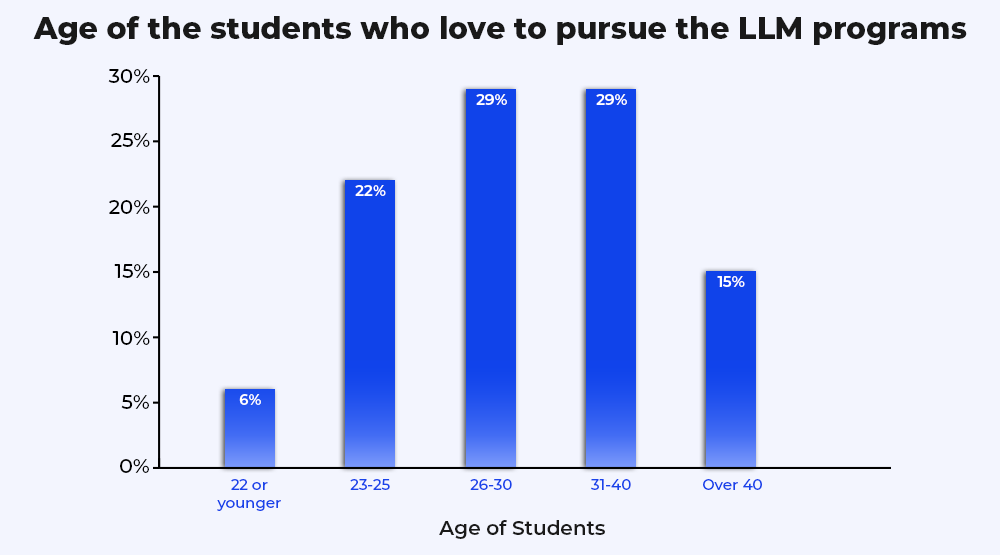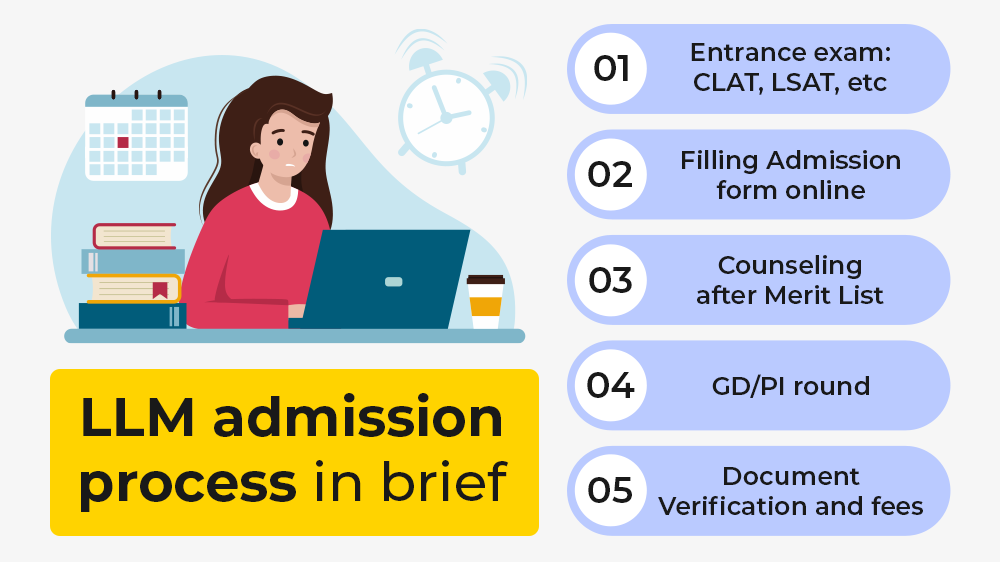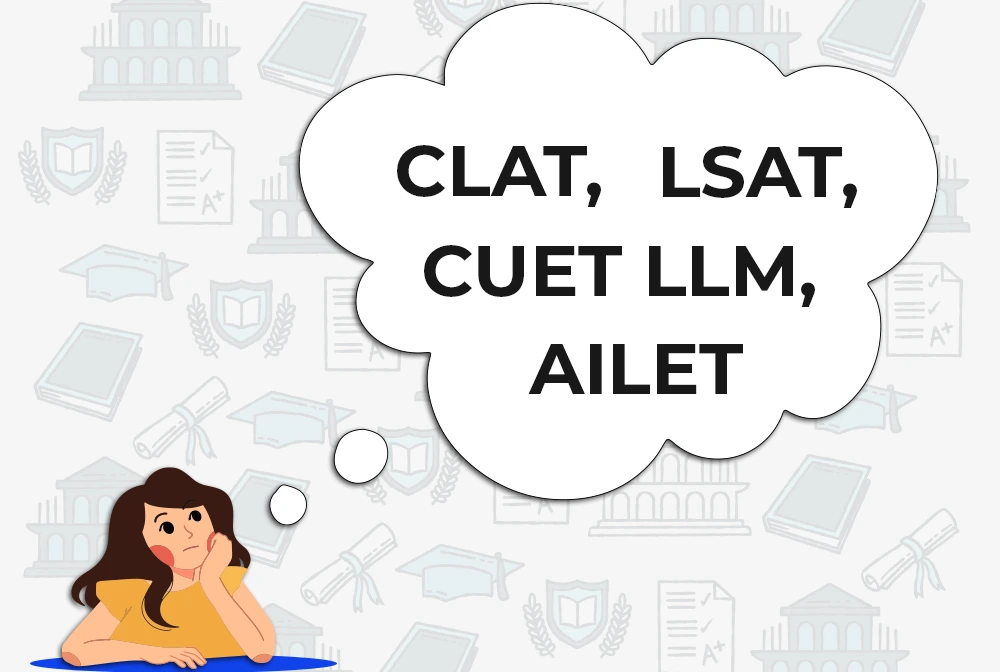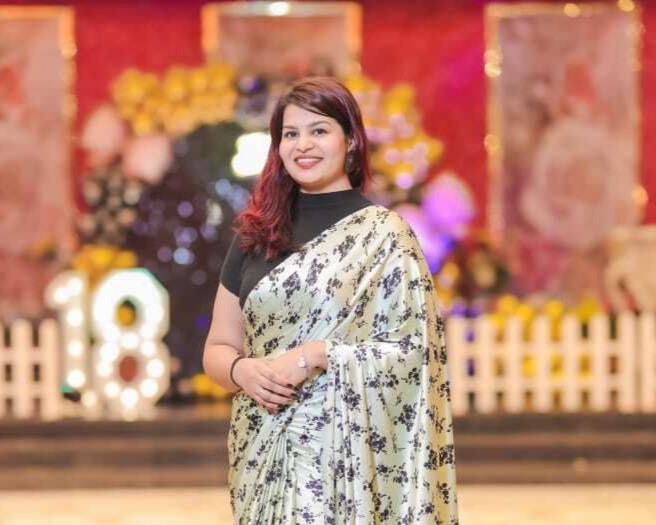Expert Interviews
- University Reviews
- Career Guide
 Video Counseling
Video CounselingImportant Facts
- Ask any Question - CV Forum

Top LLM Entrance Exams in India 2026 - Eligibility, Syllabus
Sonika Jan 22, 2026 1.2K Reads

If you are a person who loves to know about the law whether it's India Law or International Law, then you must think about pursuing an LLM program in whatever subject you are interested in. A total of 15,000 candidates registered for CLAT PG 2026 out of which 13,500 appeared in the exam. If we see the success rate for the CLAT PG 2026 exam then it is just 11.78%. This means only 1591 students get seats. Students whose age lies between 26 and 40 are the ones that are choosing LLM and and apply for exams. You can easily see the stats discussed above.

About LLM
If you are a law enthusiast, then you have come to the right place to learn more about the LLM program and the exams that you should take before enrolling in any university offering an LLM program. Before we start to learn about the entrance exams, let’s discuss a little bit about the LLM program.

An LLM is a 2-year program that stands for a Master in Laws. After completing an LLB program, you should pursue an LLM program. Pursuing an LLM program has multiple advantages over starting work after graduation. LLM opens a wide gateway of opportunities, like you can become a legal associate, judicial service aspirant, legal journalist, and more. Let’s discuss about the eligibility criteria to enroll in an LLM program.
Eligibility criteria for the LLM program
Aspirants who wish to pursue an LLM degree must first ensure the specialization in which they want to pursue their law degree. After this, they should find out the college which is offering that particular specialization you decided to choose. After confirming that you would go with any particular university/college, then check its eligibility criteria. Almost every university has almost similar set of eligibility criteria.
Let’s discuss the general eligibility criteria for an LLM program:
- There is a fixed percentage that you should score in your last qualification and that is generally 55% marks.
- Also, some universities offer a 5 % concession to students belonging to the reserved category in India.
- The university from which you have done your graduation degree must be a recognized university.
- Need good marks in the entrance exam as required by the university.
Top LLM entrance exams
Multiple universities are there that are offering LLM programs and ask for the various entrance exams. These exams may include CLAT, LSAT, AILET, CUET LLM, DU LLM, and more. Well, it is necessary to take any entrance exam to get admission to one of the top universities in India that are offering LLM programs. However, apart from regular LLM programs, many universities are offering part-time LLM, 1-year LLM, LLM, and LLM for working professionals. For most of these LLMs too, an entrance exam is a must. Let’s discuss about top LLM entrance exams in India.

1) CLAT
Every year, NLU conducts CLAT exams for admissions to undergraduate and postgraduate law programs. This exam is generally conducted for admission to the 24 National Law Universities in India. Apart from the NLUs, other universities also consider the marks obtained in the CLAT exam for admission purposes. Additionally, for the integrated programs as well, NLU considers the CLAT exam.
Let’s get into more detail about the CLAT exam:
|
Description |
|
|
Name of Exam |
Common Law Admission Test (CLAT) |
|
Conducting Body |
Consortium of National Law Universities |
|
Total Questions |
120 |
|
Duration of the Exam |
2 hours |
|
Question Type |
Multiple-choice questions (MCQs) |
|
Marking Scheme |
1 mark for each correct answer |
|
Negative Marking |
0.25 marks were deducted for every wrong answer |
Eligibility Criteria
Every exam has its eligibility criteria; here we are discussing the eligibility criteria for the CLAT exam. Let’s get started.
- LLB must be completed or some equivalent degree with at least 50% marks for the students who belongs to GEneral/OBC/NRI categories and 45% marks for the students of reserved categories (SC/ST/PWD).
- No upper limit to sit in the CLAT examination candidates who are appearing for the qualifying exams
For more clarity, you can visit their official website by CLICKING HERE . This will direct you to the official website of the Consortium of NLUS.
Fee
Every standardized exam has its registration fee, and so does the CLAT exam. Let’s see the application fee for the CLAT exam:
- Application fee for the applicants who are from General/OBC/NRI categories - INR 4,000/-
- Application fee for the applicants who belong to the reserved category (SC/ST/BPL/PWD) - INR 3,500/-
- The price of the previous year is INR 500/- (additional charges than that of the application fee)
- The application fee is non-refundable
Exam Pattern
There will be 5 sections in the CLAT exam. A total number of questions will be 120 and each question carries one mark each. Also, there will be a negative marking of 0.25 mark. So, students need to be sure before marking the answer of the question. Below given table is for the exam pattern as of now.
Total marks - 120
|
Pattern |
No. of questions |
Weightage (100%) |
|
English language |
22-26 |
20% |
|
Qualitative Techniques |
10-14 |
10% |
|
Legal Reasoning |
28-32 |
25% |
|
Logical reasoning |
22-26 |
20% |
|
GK and current affair |
28-32 |
25% |
Syllabus
The applicant must understand the syllabus that is specified by every exam whether it's for a Law field, medical, technical, or any other field. Let's see what you need to focus on for the CLAT exam. Below given is the table with the exam pattern (Sections) along with their syllabus.
|
Pattern |
Syllabus |
|
English language |
|
|
Qualitative Techniques |
|
|
LegalReasoningg |
|
|
Logical reasoning |
|
|
GK and current affair |
|
2) LSAT - Discontinued from the 2026 cycle
The Law School Admission Test (LSAT) is one of those standardized exams which universities or institutions ask students to qualify for. You need to study hard to crack this exam. The LSAT exam is administered by the Law School Admission Council (LSAC). Let’s have a look at the table to get the general idea about the exam, and then we will discuss them all in detail.
|
Section |
Description |
|
Name of Exam |
Law School Admission Test (LSAT) |
|
Conducting Body |
Pearson VUE on behalf of the Law School Admission Council (LSAC) |
|
Exam Mode |
Computer-based proctored hybrid exam |
|
Total Questions |
92 |
|
Duration of the Exam |
2 hours and 20 minutes |
|
Question Type |
Multiple Choice Questions |
|
Marking Scheme |
On a scale of 420-480 score band and percentile |
|
Negative Marking |
No negative marking |
Eligibility Criteria
Let’s check the eligibility criteria set by the authorities. The below listed criteria are needed to be fulfill.
- Candidates must have completed their bachelor's degree in law.
- The university or college must be recognized.
- The minimum marks required to apply for this exam is 55% but for the students who belong to the reserved categories, they get 5% relaxation, so, they need to attain 50% marks in their LLB program.
Fee
LSAC decided to not conduct this exam anymore from the 2026 cycle.
Exam pattern
The LSAT exam is conducted in an hybrid mode, as this is a computer-based test (CBT). The duration of this exam is 2 hours and 20 minutes where you need to do a total of 92 questions. Here, in this exam, you get to see 4 sections: analytical reasoning (1 section), Logical reasoning (2 sections), and reasoning comprehension (1 section). There will be only multiple-choice questions (MCQs). Below is the exam pattern along with the number of questions each section contains and the allotted time for each section.
|
Sections |
No. of questions |
Allotted time for each |
|
Analytical Reasoning |
23 |
35 minutes |
|
1st Logical Reasoning |
22 |
35 minutes |
|
2nd Logical Reasoning |
23 |
35 minutes |
|
Reading Comprehension |
24 |
35 minutes |
*There will be no negative marking in this LSAT exam, so you can easily mark any answer for the questions you don’t know the exact answer.
Syllabus
The syllabus for this exam is given below but there is no point looking for its syllabus anymore. This exam was one of the most important exams that students used to prepare but now you need to look for alternative exams. Still below is the table for the LSAT exam syllabus.
|
Pattern |
Syllabus |
|
Analytical reasoning |
|
|
Logical reasoning |
|
|
Reading comprehension |
|
3) AILET
The All India Law Entrance Test (AILET) is conducted by the National Law University Delhi (NLU, Delhi). This exam is conducted for law students who wish to get a higher education in a certain subject or topic. Generally, this Exam is conducted for both UG and PG programs. Let’s see more details about this exam, like eligibility criteria, fee structure, exam pattern, and syllabus.
|
Section |
Description |
|
Name of Exam |
All India Law Entrance Test (AILET) |
|
Conducting Body |
National Law University, Delhi (NLU Delhi) |
|
Total Questions |
150 |
|
Duration of the Exam |
120 minutes |
|
Question Type |
Multiple-choice questions (MCQs) |
|
Marking Scheme |
1 mark for each correct answer |
|
Negative Marking |
0.25 marks will be deducted for every wrong answer |
Eligibility Criteria
All India Law Entrance Test (AILET) has some eligibility criteria to fulfill before applying for this entrance exam. Below are a few eligibility criteria:
- Students who have completed their LLB at any accredited university are eligible to apply for this AILET test.
- Students must receive at least 55% of the possible points, while SC/ST applicants and individuals with disabilities must receive at least 50%.
- Candidates may also apply for this entrance exam if they are already taking or are awaiting the results of their qualifying examinations.
Fee
The fee structure for the All India Law Entrance Test (AILET) is given below.
- Aspirants belonging to the General/OBC/EWS/Foreign Nationals/Kashmiri Migrants - INR 3,500/-
- Aspirants from reserved categories (SC/ST/Persons with Disability PwD) - INR 1,500/-
- BPL aspirants of SC/ST category - INR 1,500/-
Syllabus
Before preparing for any exam, the syllabus is a must to look for. Every standardized exam has its syllabus developed by the authorities. The syllabus for any AILET is decided by the suggestions of the law professionals and professors. Let’s have a look at the syllabus for the AILET exam.
|
Pattern |
Syllabus |
|
English Section |
|
|
GK & Current Affairs |
|
|
Logical Reasoning |
|
|
Legal Topics |
|
4) CUET LLM
The Common University Entrance Test for postgraduate Master of Laws is an entrance exam for law graduates. This exam is conducted by the National Testing Agency. This exam helps the students to gain admission into one of the good institutions. In this exam, there are 75 Multiple-choice questions and each correct answer will get you +4 marks and an incorrect answer will deduct -1 marks out of the total marks.
|
Section |
Description |
|
Name of Exam |
Common University Entrance Test for Postgraduate Master of Laws |
|
Conducting Body |
NTA (National Testing Agency) |
|
Total Questions |
75 |
|
Mode of examination |
Hybrid |
|
Duration of the Exam |
105 minutes |
|
Question Type |
Multiple Choice Questions (MCQs) |
|
Marking Scheme |
4marksk for each correct answer |
|
Negative Marking |
1 mark will be deducted for every wrong answer |
Eligibility Criteria
- If you want to apply for CUET, you must have an LLB degree.
- Any accredited university in India or abroad must award a bachelor's degree.
- 50% in LLB for general categories and 45% for reserved categories are the minimum scores needed to apply for CUET.
Fee
- Fee for applicant of General category - INR 1,400/-
- Fee for the applicant of OBC-NCL/GenEWS - INR 1,200/-
- Fee for the applicant of SC/ST/Third gender - INR 1,100/-
- Fee for the applicant of PwBD - INR 1,000/-
The above fee is applicable for choosing at least two papers.
The below-listed fee is applicable for choosing additional subjects
- Fee per subject for the applicant of General category - INR 700/-
- Fee per subject for the applicant of OBC-NCL/GenEWS - INR 600/-
- Fee per subject for applicant of SC/ST/Third gender - INR 600/-
- Fee per subject for the applicant of PwBD - INR 600/-
Syllabus
Before starting to prepare for the CUET LLM exam, you must take an overview of the syllabus that they will be going to ask in the exam. Every topic listed in given table below has its sub-topics that you need to focus on to clear this CUET LLM exam. The syllabus for every subject varies. To learn more about the syllabus, take a look at the below-given table:
|
Important topics |
|
|
Contract: General Principle of Contracts |
Constitution |
|
Law of Torts |
Family Law: Hindu Law |
|
Criminal Law: Indian Penal Code |
Contract - II |
|
Company Law |
Property Law |
|
Administrative Law |
Family Law - II; Mohammedan Law and Indian Succession Act |
|
Environmental Law |
Labour Law |
|
Criminal Law - II: Criminal Procedure Code, 1973, Juvenile Justice |
Jurisprudence |
|
Clinical Course - I: Professional Ethics and Professional Accounting System |
Public International Law |
|
Human Rights Law and Practice |
Right to information |
|
Banking law |
Insurance law |
|
Alternative dispute resolution system |
Civil procedure code and limitation act |
|
Intellectual property rights - I |
Penology & victimology |
|
Integration of Statutes & Principles of Legislation |
Competition law |
|
Law of evidence |
taxation |
|
Intellectual property rights - II |
White-collar crimes (Privileged class deviance) |
|
Women and Criminal Law & law relating to child |
Law relating to international trade |
Overview of the fee structure for various entrance exams:
|
Entrance exam |
Registration fee for the general category (INR) |
Registration fee for reserved category (INR) |
|
CLAT |
4,000 |
3,500 |
|
LSAT- Discontinued |
3,999 |
3,999 |
|
AILET |
3,500 |
1,500 |
|
CUET LLM |
1,400 |
1100 |
Top universities offering LLM programs
Based on the recent NIRF (National Institutional Ranking Framework) ranking list, below is a list of universities that are offering the LLM. The following universities are quite reputable and offer the best educational experience to their students. Let’s have a look at these universities:
|
NIRF Ranking |
University |
Fee |
|
1. |
National Law School of India University, Bangalore |
|
|
2. |
National Law University, Delhi |
|
|
3. |
Nalsar University of Law |
|
|
4. |
NLU Kolkata - The West Bengal National University of Judicial Sciences |
|
|
5. |
Symbiosis Law School, Pune |
|
|
6. |
Faculty of Law, Jamia Millia Islamia |
|
|
7. |
IIT Kharagpur - Indian Institute of Technology |
|
|
8. |
Gujarat National Law University, Gandhinagar |
|
|
9. |
Siksha ‘O’ Anusandhan University - SOA National School of Law |
|
|
10. |
Babasaheb Bhimrao Ambedkar University (BBAU), Lucknow |
|
*The above-listed fee for each of the Universities was written based on the data available in December 2024. The actual tuition fee may vary, so kindly visit the official websites and check out there.
OP Jindal Global Law School
Jindal Global Law School offers an LLM program in a blended learning mode (a Hybrid Mode). The institution provides access to its Learning Management System where students can learn through various types of study material including e-books, case studies, live lectures, recorded lectures, assessments, and more. Let’s learn more about the specializations offered, the fee structure, and the syllabus provided.
Fee structure: Course fee - INR 3,50,000
Eligibility Criteria:
- Aspirants must have completed a 3-year or a 5-year Law degree with a minimum 55% marks from some recognized university or institution.
- To get admission to Jindal Global Law School, the students must qualify for the admission entrance test conducted by the Jindal Global Law School itself, or a few other exams can be considered (including LSAT, CLAT PG, or DU LLM ).
- If a student has qualified International LSAT entrance examination, then the SAT exam is not necessary to attempt.
Specialization offered:
- Corporate & Financial Law
- AI and Emerging Technologies
- Intellectual Property & Technology Law
- Dispute Resolution
- Taxation Law, Policy, and Regulation
|
Syllabus at Jindal Global Law School (Blended Learning Program) |
|
|
Specializations |
Syllabus/Subjects |
|
Corporate & Financial Law |
|
|
AI and Emerging Technologies |
|
|
Intellectual Property & Technology Law |
|
|
Dispute Resolution |
|
|
Taxation Law, Policy and Regulation |
|
*Syllabus may get vast if compared semester-wise.
Conclusion
LLM is a postgraduate program for law professionals. This is a 2–year course. To secure a good university, institute, or college so that you can get what you want, in terms of knowledge. To be eligible for an LLM program, some standardized exams are asked by some top universities of Law. In this blog, you learned about the main entrance exams that will help you to get into a good law institute. Getting a higher education will help you to enhance your knowledge in a certain discipline or subject. You get to learn about their eligibility criteria, fee structure, exam pattern, and syllabus.
FAQs (Frequently Asked Questions)
Every university and college has its set criteria for admission. Let’s see the general eligibility criteria for admission to a Law School:
- Candidate must have completed their bachelor in Law from some recognized university
- They must have attained a minimum mark of 55%.
- Must have prior knowledge of the domain they are choosing for admission in an LLM program.
If you belong to a reserved category then there may be some chance. Some universities offer a relaxation of 5%.
List a few top Law schools:
- There are multiple universities and colleges that offer good quality education to law students. Still, here are some names listed below that are top 10 law universities, ranked by NIRF.
- National Law School of India University, Bangalore
- National Law University, Delhi
- Nalsar University of Law
- NLU Kolkata - The West Bengal National University of Judicial Sciences
- Symbiosis Law School, Pune
- Faculty of Law, Jamia Millia Islamia
- IIT Kharagpur - Indian Institute of Technology
- Gujarat National Law University, Gandhinagar
- Siksha ‘O’ Anusandhan University - SOA National School of Law
- Babasaheb Bhimrao Ambedkar University (BBAU), Lucknow
After pursuing an LLM in any of the specializations, you can see your future in any field. Law professionals are required in almost every field. Also, you can switch your profession even after completing your LLM program. Here are fa ew of the career options for you: Lawyer, Judiciary, Teaching, Legal advisor, Government services, Private companies, Legal analyst, Legal writer, Patent analyst, Higher education, Legal researcher, Corporate counselor, Junior Advocate, Journalist, Politics, and more.
Yes, it is possible to study from the comfort of your home. For this, you can enroll in an LLM 1-year program, LLM distance learning program, LLM for working professionals, and LLM part-time LLM.

By Sonika
3 Years of experience/ academic writer/ freelance writer
An academic writing expert with an experience of 4 years.
Every query is essential.
Our team of experts, or experienced individuals, will answer it within 24 hours.
Recommended for you
Tired of dealing with call centers!
Get a professional advisor for Career!
LIFETIME FREE
Rs.1499(Exclusive offer for today)

Pooja
MBA 7 yrs exp

Sarthak
M.Com 4 yrs exp

Kapil Gupta
MCA 5 yrs exp
or



Career Finder
(Career Suitability Test)
Explore and Find out your Most Suitable Career Path. Get Started with our Career Finder Tool Now!
ROI Calculator
Find out the expected salary, costs, and ROI of your chosen online university with our free calculator.
